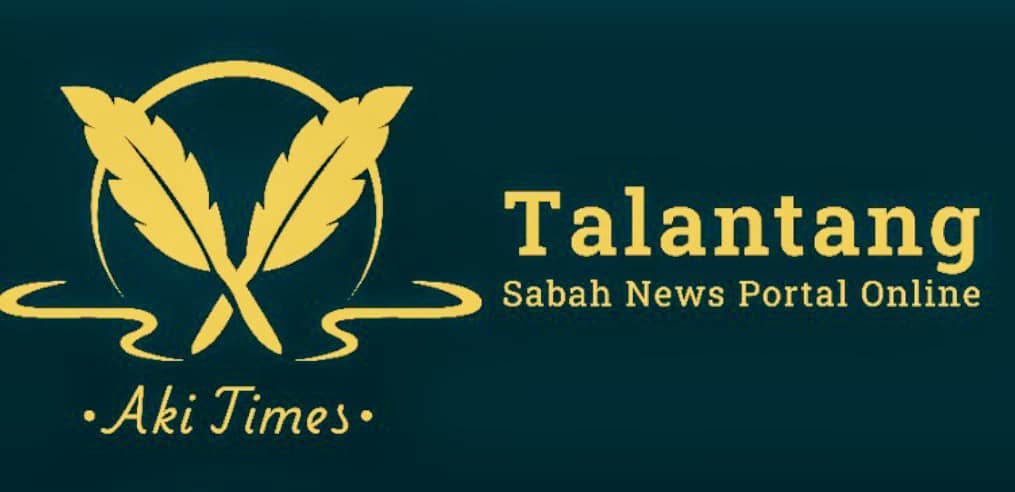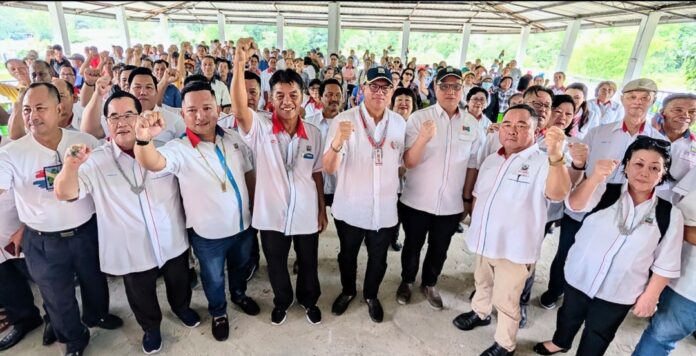Joniston (4th from right) and Demis (4th from left) with PBS Kadamaian AGM delegates and observers.
KOTA BELUD : – Gabungan Rakyat Sabah (GRS) information chief Datuk Joniston Bangkuai says Sabah’s current political stability reflects the coalition’s strength as a locally led government.
He said this is in stark contrast to Parti Warisan and Parti Kesejahteraan Demokratik Masyarakat (PKDM), which were willing to work with Umno in an attempt to overthrow Chief Minister Datuk Seri Hajiji Noor in January 2023.
“They campaigned on ‘Sabah for Sabahans, No to Peninsula-based Parties’ and even Shafie Apdal called for unity to topple BN in Sabah. But when the chance came, Parti Warisan ran straight to Umno.”
“If that ‘power grab’ attempt had gone through, Sabah would have seen a government led by Umno, possibly dictated by Kuala Lumpur, and not a Sabah-based party or coalition,” said Joniston, who is also Parti Bersatu Sabah (PBS) Information Chief.
Officiating the Kadamaian PBS division annual general meeting today, Joniston said the move by Warisan and PKDM was political hypocrisy that Sabahans should not forget.
“You cannot say one thing and do the opposite when it suits you. They sold a narrative to the people, but when power was at stake, they were ready to abandon it,” he added.
Another clear proof of Parti Warisan and PKDM hypocrisy is their support for Umno’s decision, through the Federal Ministry of Rural and Regional Development, to “bulldoze” the establishment of Jawatankuasa Desa Madani (JKDM) in villages in Sabah.
While the GRS-led State government vehemently opposed the JKDM, describing it as a “divide and rule” tactic, considering that each village already had the Jawatankuasa Keselamatan dan Kemajuan Kampung (JKKK), Parti Warisan and PKDM willingly supported it, with many of its grassroots leaders appointed as chairman.
In contrast, Joniston said GRS has established itself as the dominant force in Sabah politics by uniting local-based parties to ensure stability and cohesion.
The Kiulu assemblyman noted that Pakatan Harapan (PH) recognised GRS’s position and opted to work with the Hajiji-led local coalition in the interest of political stability in the State.
“When a peninsula-based party like PKR and DAP chooses to throw its support to Hajiji and cooperate with GRS, it reflects the strength and stability GRS brings in uniting local voices that deliver,” he said.
He described GRS’s approach as striking a balance between strategic federal cooperation and maintaining local leadership, allowing Sabah to secure development support while keeping decision-making firmly in the state’s hands.
Joniston urged PBS members and GRS supporters to stay united and focused as the next state election approaches, which analysts expect could happen next month.
He reaffirmed that GRS will continue prioritising Sabah’s rights under the Malaysia Agreement 1963 (MA63) while working closely with federal partners to bring investments, infrastructure, and opportunities to the state.
“Unity has kept us strong, and the people want stability. That is what GRS and PBS continue to deliver.
“Our focus is on progress for the people of Sabah, and that means protecting our autonomy while securing the support we need to move forward,” he said.
In the AGM, Joniston commended PBS Kadamaian, headed by Demis Rumanti, for its perseverance in ensuring the continued relevance of the party in the area.
“Kadamaian will always be in PBS radar as a potential seat it could win,” he said to loud cheers of approval from the more than 300 delegates and observers.

